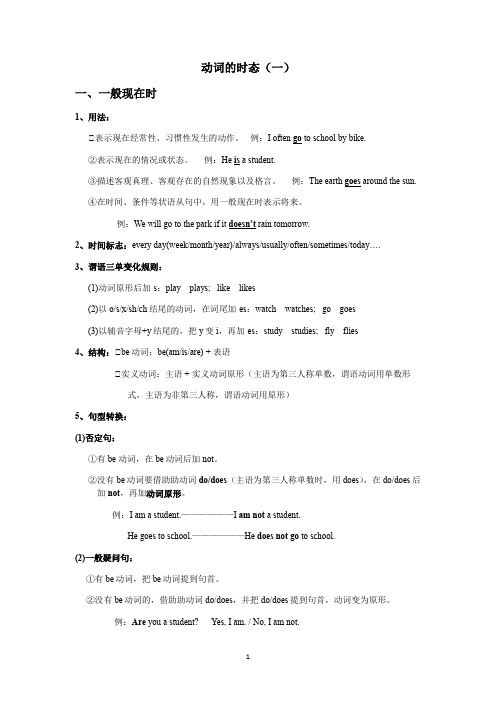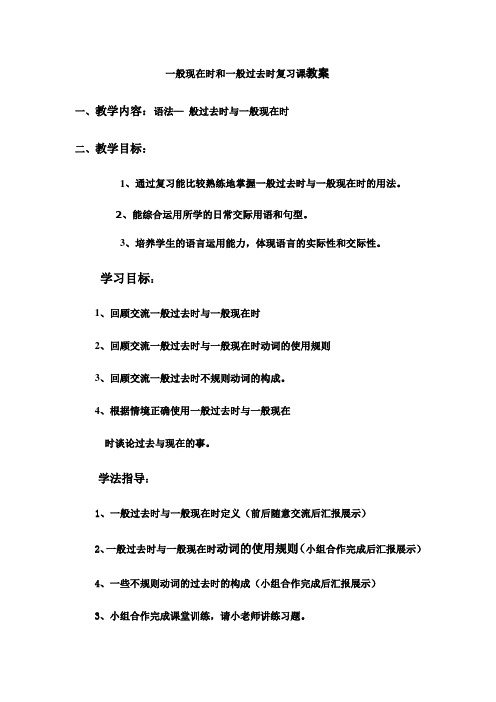中考人教版初中英语语法---一般现在时和一般过去时教学案及练习.docx
九年级英语一般现在时与一般过去时复习公开课教案

九年级英语一般现在时与一般过去时复习公开课教案阮凌云复习目标:知识目标:1.复习一般现在时与一般过去时的用法,结构及其所连用的时间状语。
2.区别一般现在时与一般过去时的用法,结构及其所连用的时间状语。
3.注意动词第三人称单数与规则动词的过去式的变化规则。
能力目标:能熟练运用一般现在时与一般过去时。
情感目标:通过合作学习,提高学生的合作意识,自主参与学习的意识,提高兴趣,分享学习成果。
复习过程:[基础演练]时态概念结构时间状语规则动词一般现在时肯定句:I/We/They+V( )+其他.He/She+V( ) + 其他.第三人称单数:1.puts2.goes3.flies否定句:I/We/They+( )+V( )+其他.He/She+( )+V( )+其他一般疑问句:( )+you/they+V( )+其他?( )+he/she +V( )+其他?一般过去时肯定句:I/We/They/He/She+V( )+其他.过去式:1.helped2.lived3.studied4.stopped否定句:I/We/They/He/She+( )+V( )+其他.一般疑问句:( )+you/they/he/she+V( )+其他?I.Task1. Talk about the activities you usually do with the phrases and sentences in pairs.参考词汇:go to the movies , watch TV , shop , exercise , read English books , relax at home do my homework. , clean my room , visit my grandparents , play basketball , help my parents , play computer games……参考句型: A: What do you usually do on weekends? B: I usually…….A: How often do you …….? B: I……….once/twice/three times….a week/month/year….II.Task2. Talk about the activities he/she usually does with the phrases and sentences in groups.参考词汇: 同上参考句型: A: What do you usually do on weekends? B: I usually…….A: How often d o you …….? B: I……….once/twice/three times….a week/month/year….C:What does he/she usually do on weekends? D: He/She usually V(s/es) C:How often does he/she ……? D:He/She V(s/es)…… once/twice/three times….a week/month/year…Summary:讨论并总结一般现在时的用法,结构,所用的时间状语及动词第三人称单数的构成规则,并填写在表格内。
最新中考人教版九年级英语语法专练学案七动词时态(有答案)

中考人教版九年级英语语法专练学案七动词时态(有答案)一、关于考点一般现在时、一般过去时、一般将来时、过去将来时、现在进行时、过去进行时、现在完成时、过去完成时。
二、关于用法9.一般将来时态:表示将来存在的状态(be动词),将来经常做的动作I will do it. 我将要做这件事。
10.将来进行时态:表示将来正在进行的动作I will be doing it. 我将要正在做这件事。
11.将来完成时态:表示到将来的某个时间已经完成,对那个时间产生影响,形成结果I will have done it. 我(到将来的某个时间)已经做完这件事了。
12.将来完成进行时态:表示将来一直在进行的动作(字面意思已经在进行)I will have been doing it. 我(到将来的某个时间)将一直在做这件事。
Ⅳ过去将来时态:四种(平时根本用不到,只在讲故事或小说中出现)13.一般过去将来时态:表示对过去的某一时间来讲的将来存在的状态(be动词),将来经常做的动作,对现在来讲已成过去I would do it.14.过去将来进行时态:表示对过去的某一时间来讲的将来正在进行的动作,对现在来讲已成过去I would be doing it.15.过去将来完成时态:表示对过去的某一时间来讲的到将来的某个时间已经完成,对那个时间产生影响,形成结果,对现在来讲已成过去I would have done it.16.过去将来完成进行时态:表示对过去的某一时间来讲的将来一直在进行的动作(字面意思已经在进行),对现在来讲已成过去I would have been doing it.一般现在时主要用于下面几情况:1)描述当前时间内经常出现、反复发生的动作或存在的状态。
They raise ducks as a sideline .他们以养鸭为副业。
2)仅为了描述状态、性质、特征、能力等等。
这里的目的是为了"描述现阶段的动作或状态",其重点"不是强调动作发生的时间、或进行的状态"。
中考一般现在时、一般过去时、一般将来时讲义

动词的时态(一)一、一般现在时1、用法:①表示现在经常性、习惯性发生的动作。
例:I often go to school by bike.②表示现在的情况或状态。
例:He is a student.③描述客观真理、客观存在的自然现象以及格言。
例:The earth goes around the sun.④在时间、条件等状语从句中,用一般现在时表示将来。
例:We will go to the park if it doesn’t rain tomorrow.2、时间标志:every day(week/month/year)/always/usually/often/sometimes/today….3、谓语三单变化规则:(1)动词原形后加-s:play---plays; like---likes(2)以o/s/x/sh/ch结尾的动词,在词尾加-es:watch---watches; go---goes(3)以辅音字母+y结尾的,把y变i,再加-es:study---studies; fly---flies4、结构:①be动词:be(am/is/are) + 表语①实义动词:主语 + 实义动词原形(主语为第三人称单数,谓语动词用单数形式,主语为非第三人称,谓语动词用原形)5、句型转换:(1)否定句:①有be 动词,在be动词后加not。
②没有be动词要借助助动词do/does(主语为第三人称单数时,用does),在do/does后加not,再加动词原形。
例:I am a student.——————I am not a student.He goes to school.——————He does not go to school.(2)一般疑问句:①有be动词,把be动词提到句首。
②没有be动词的,借助助动词do/does,并把do/does提到句首,动词变为原形。
例:Are you a student? Yes, I am. / No, I am not.Does he go to school? Yes, he does. / No, he doesn’t.二、一般过去时1、定义:用于表示过去时间内发生的动作。
一般现在时和一般过去时复习课教案

一般现在时和一般过去时复习课教案一、教学内容:语法—般过去时与一般现在时二、教学目标:1、通过复习能比较熟练地掌握一般过去时与一般现在时的用法。
2、能综合运用所学的日常交际用语和句型。
3、培养学生的语言运用能力,体现语言的实际性和交际性。
学习目标:1、回顾交流一般过去时与一般现在时2、回顾交流一般过去时与一般现在时动词的使用规则3、回顾交流一般过去时不规则动词的构成。
4、根据情境正确使用一般过去时与一般现在时谈论过去与现在的事。
学法指导:1、一般过去时与一般现在时定义(前后随意交流后汇报展示)2、一般过去时与一般现在时动词的使用规则(小组合作完成后汇报展示)4、一些不规则动词的过去时的构成(小组合作完成后汇报展示)3、小组合作完成课堂训练,请小老师讲练习题。
三、教学重点:一般过去时与一般现在时的句式结构。
四、教具准备多媒体五、教学过程(一)学生运用学习方法根据学习目标的要求自主学习,并逐一做好记录(给学生足够的时间)(二)学生交流展示:(让学生自己互补、超越、矫正、质疑、评价,最终得出正确答案)1、一般现在时定义:2、一般过去时定义:3、一般现在时动词的使用规则:4、一般过去时规则动词的过去式的构成:5、不规则动词的过去时的构成:cost—cost cut—cut hit—hit hurt—hurt let—let put—put read—read set—set shut—shut beat—beatbring—brought buy—bought think—thoughtbuild—built lend—lent send—sent spend—spentcatch—caught teach—taughtkeep—kept sleep—slept sweep—swepttell—told sell—soldsmell—smelt spell—spelt feel—felt spill—spiltsay—said pay—paid lay—laid hear—heardmeet—met get—got sit—sat find—found hold—held spit—spatdig—dug lose—lost break—broke choose—chose freeze—froze spe ak—spoke wake—woke forget—forgot come—came become—became run—ran fall—fell give—gavemake—made leave—left stand—stood have(has)—had understand—understood begin—began drink—drank sing—sang ring—rang swim—swam sink—sankblow—blew draw—drew grow—grew know—knew throw—threw drive—drove write—wrote ride—rode rise—rosebe—was(were)eat—ate see—saw hide—hid do—did fly—flew go —went lie—lay show—showed wear—woretake—took mistake—mistookcan—could may—might will—would shall—should(三)、一般过去时练习(学生自主完成后,选小老师讲解)请用正确动词形式填空。
初中6个基本时态教案

教案:初中英语六种基本时态教学一、教学目标:1. 知识目标:让学生掌握英语六种基本时态(一般现在时、一般过去时、一般将来时、现在进行时、过去进行时、过去完成时)的定义、结构及用法。
2. 能力目标:培养学生运用英语六种基本时态进行口语表达和书面表达的能力。
3. 情感目标:激发学生学习英语的兴趣,培养学生的自信心,使学生在学习过程中感受到英语学习的乐趣。
二、教学重点与难点:1. 教学重点:英语六种基本时态的定义、结构及用法。
2. 教学难点:英语六种基本时态的区分和运用。
三、教学步骤:1. 导入:通过提问方式引导学生回顾已学过的动词形式,为新课学习做好铺垫。
2. 讲解:(1)一般现在时:表示经常发生的事情、普遍真理和习惯。
(2)一般过去时:表示过去发生的事情。
(3)一般将来时:表示将来会发生的事情。
(4)现在进行时:表示正在发生的事情。
(5)过去进行时:表示过去正在发生的事情。
(6)过去完成时:表示在过去某个时间点之前已经完成的事情。
3. 练习:(1)让学生用六种基本时态分别造句,加深对时态的理解。
(2)进行时态辨析练习,提高学生对时态的运用能力。
4. 课堂活动:分组进行角色扮演,让学生在实际语境中运用六种基本时态。
5. 总结:对本节课所学内容进行总结,强调六种基本时态的用法及区分。
6. 作业布置:让学生课后用六种基本时态写一篇小短文,巩固所学知识。
四、教学反思:在教学过程中,要注意引导学生通过实际语境来感知和运用六种基本时态,提高学生的口语表达和书面表达能力。
同时,要关注学生的学习进度,及时解答学生的疑问,确保教学效果。
初中语法一般现在时,一般过去时,现在进行时(附答案).docx

一般现在时(1)表示经常或习惯性的动作。
⑵常与频率副词:never从来不seldom极少sometimes有时often经常usually 常常always 总是或every day 每天、in the morning / afternoon / evening 在早上/下午/晚上等连用。
(3)结构:①be型主语+be动词+其他。
表示主语的个性、特征或状态。
a.肯定句中,只出现be,如:I am a student.我是一名学生。
b・否定句中,要在be后面加not,如:She isn't a teacher.她不是教师。
c.一般疑问句,要将be放在句子开头(注意句首字母大写),句尾用问号,答语用Yes,主语+be.或No,主语+be+not.如:一Are you ready?一你准备好了吗?一Yes, I am.一是的,我准备好了。
(一No, Pm not.一不,我没准备好。
)②实义动词型主语+动词原形/动词第三人称单数s/es+其他。
表示经常性或习惯性的动作。
a.肯定句中,只出现实义动词,女口:I get up in the morning.我早晨起床。
b.否定句屮,在实义动词前而加do(does)+not, do(does)作助动词,本身无意义, 常与not 缩写成don'tCdoesn't),如:I don't like vegetables.我不喜欢蔬菜。
c.一般疑问句,要在句子开头加助动词Do(does),句尾用问号,简略答语用Yes,主语+do(does).或No,主语+do(does)+not.女口:一Do you like oranges?一你喜欢桔了吗?—Yes, Ido.—是的,我喜欢。
(—No, I don't.—不,我不喜欢。
(5) 一般现在时用行为动词的原形,但第三人称单数作主语时,动词耍用第三人称单数形式。
三单变化:①多数在动词后+s play 一plays like 一likesask■一asks work■一works get■一gets stay—stays②以字母s, x, ch, sh或o结尾的动词,在词尾直接加-es. watch-一watcheswish―wishes fix■一fixes do-一does go-一goes pass―passes③以“辅咅字母加・y”结尾的动词,要先变y为i再加-es. try—tries study■一studies cry—cries fly■一flies④不规则变化:be——is are have——has练习1.We often _____ (play) in the playground.2.He _____ (get) up at six o'clock.3. ____ you ______ (brush) your teeth every morning.4.What (do) ______ he usually (do) ______ after school?5.Danny _____ (study) English, Chinese, Maths, Science and Art at school.6.Mike sometimes ________ (go) to the park with his siste匚7.At eight at night, she __________ (watch) TV with his parents.8. _______ Mike ________ (read) English every day?9.How many lessons _________ your classmate ________ (have) on Monday?10.What time ________ his mother _________ (do) the housework?I.Do you often play football after school?(肯定回答)2.1have many books.(改为否定句)3.Gao Shan's sister likes playing table tennis (改为否定句)4.She lives in a small town near New York.(改为一般疑问彳U)5.1watch TV every day.(改为一般疑问句)6.David has got a goal.(改为一般疑问句)7.We have four lessons.(否定句)& Nancy doesn't run fast (肯定句)9.My dog runs fast.否定句:一般疑问句:10.Mike has two letters for him. 一般疑问句:否定句:II. 1 usually play football on Friday afternoon.否定句:一般疑问句:划线提问12.Su Yang usually washes some clothes on Saturday.否定句:一般疑问句:划线捉问:13.Mingming usually waters the flowers every day 否定句:般疑问句:划线提问14.Tom does his homework at home.否定句:一般疑问句:划线提问一般过去时(1)一般过去时表示在过去某个时间发生的动作或存在的状态.(2)常'和yesterday, last night/year, two days/weeks ago, just now. a moment ago, in 1990/2006等表示过去的时间状语连用。
2024年人教版中考英语时态复习一般过去时教案

中考英语时态复习Simple Past Tense一般过去时态学情分析学生对过去时态的学习从七年级开始,不间断的循序渐进的学习,但是因为没有一个系统的复习,所以学生对一般过去时态的含义,用法,结构,时间状语极其混乱,本节课就是把一般过去时态进行归纳总结,让学生对一般过去时态有一个清晰的认识。
教学内容分析初中阶段学习八种时态,其中一般过去时态是考查的重点,对一般过去时态的考查都出现在选择题,选词填空和书面表达中,错误率极高的就是选词填空,大部分学生的失分点都是时态混淆,动词过去式的变化错误等。
所以针对这些问题今天专门设计这一课。
Teaching Objectives:Instruction objectives:1, 复习一般过去时态的含义2 一般过去时用法3 一般过去时结构4 常用时间状语Ability Objectives:1,复习一般过去时态的含义,用法,结构,时间状语2,能够用今天复习的内容去完成中考中关于般过去时态的考题。
Emotion Objectives:2.培养学生的自觉主动的学习能力。
Teaching keys and difficulties:1.复习一般过去时态的含义,用法,结构2.完成相关的中考专项练习。
Teaching ways:1.归纳整理教学法2. 任务型教学法3. 讲练结合法Teaching tools:多媒体Teaching steps:Teaching One:1 一般过去时定义:一般过去时态表示过去某个时间发生的动作或存在的状态;也表示过去经常或反复发生的动作3.给出3个例句:She went to school yesterdayHe played tennis last weekHe always went to school by bus last termTeaching Two:一般过去时用法1. 在过去某一时间内发生的动作:He got home at ten o’clock last night.2. 表示过去经常或反复发生的动作, 常与often,always等表示频度的间状语连用:I often got up very early at that time.Teaching Three:一般过去时的结构:1.Be动词的一般过去时肯定句式:主语+be(was,were)+其它.否定句式:主语+be(was,were)+not+其它.一般疑问句:Be(was,were)+主语+其它2.情态动词的一般过去时态肯定句式:主语+情态动词的过去式+其它否定句式:主语+情态动词的过去式+not+其它.一般疑问句:情态动词的过去式+主语+其它?can→could,may→might,must→must,willwould,shouldshould肯定句式:主语+动词(过去式)+其它否定句式:主语+didn’t+动词(原形)+其它【did not = didn’t】一般疑问句:Did+主语+动词(原形)+其它【do,does的过去时均为did】?Teaching Four:常用时间状语A.与ago 连用:a momenttwo minutesthree hoursfive daysone weeksix monthsfour yearsB.与last连用timenightweekmonthtermMondayC. 与yesterday连用+ morning/ afternoon /eveningTeaching Five:完成相关的练习1.I ____ the number down on a piece of paper a moment ago.A. writeB. writedC. wroteD. writing2.He always _____me last term.A. helpedB. helpsC. helping3,Tom ______basketball yesterday morning.A.playB.playsC.played4.I could speak English when I ___five years old .A.wasB. am c.wereTeaching Six:中考链接,常见错误一.把动词变成过去式易出错例:1 They stoped (stop)talking just now.2 They plaied (play)football yesterday.答案: 1 stopped 2 played解析:我们可以记住下面的口诀:"动词变成过去式,双写规律要牢记;y 前若是辅音字,y 变i 加ed;y 前若是元音字,只须直接加ed. "二.忘记把动词变成过去式例:I fly (fly)kites on the afternoon of Sunday.答案:flew解析:我们可以记住下面的口诀:"一般过去时态里,过去形式莫忘记".三.在句式变换时易出错例:1 We didn' t went (not go)out last Friday.2 Did you had (have)a good time yesterday?答案: 1 didn' t go 2 Did have解析:请记住口诀"见助动,用原形。
人教版中考英语复习一般现在时过去过去时教案

3. We _______(not watch) TV on Monday.
4. Nick _______(not go) to the zoo on Sunday.
5. ______ they ________(like) the World Cup?
8. What(be)your favorite food?
四.主语为第三人称单数时,动词的变化规则
一般情况下,直接加-s,如:cook-cooks, milk-milks
以s/x/ch/sh结尾,加-es,如:guess-guesses, wash-washes, watch-watchesቤተ መጻሕፍቲ ባይዱ go-goes
eg: I was born in 1990.我出生在1990年。
I went to the park last week.我是上周去的公园。
三.一般过去时的构成
(一)Be动词的一般过去时
1.肯定句:am / is的过去式为was; are的过去式为were.
(当主语是单数时,谓语动词用was;主语是复数时,谓语动词用were。)
She is an English teacher.她是一名英语老师。
The cats are so cute.这些猫咪好可爱。
行为动词的一般现在时:主语+行为动词+其它。
如:We study Englishin Weiyuan.我们在微远学习英语。
He often plays football with his friends.他经常和朋友踢足球。
( ) 5. Mary, what about going boating if it _____ tomorrow?
- 1、下载文档前请自行甄别文档内容的完整性,平台不提供额外的编辑、内容补充、找答案等附加服务。
- 2、"仅部分预览"的文档,不可在线预览部分如存在完整性等问题,可反馈申请退款(可完整预览的文档不适用该条件!)。
- 3、如文档侵犯您的权益,请联系客服反馈,我们会尽快为您处理(人工客服工作时间:9:00-18:30)。
中考人教版初中英语语法---一般现在时和一般过去时教学案及练习同学英语学科核心素养培养与个性发展研究年级日期时间管理师辅导教师课时课题一般现在时和一般过去时行为与习惯、学科素养养成查漏补缺兴趣激发一般现在时1.用法(1)表示经常发生的动作、存在的状态或日常的习惯,常与 every day, often, always sometimes 等时间状语连用。
eg. She gets up at six every day.She is our teacher of English.We go there once a week.(2)表示主语的特征、性格、能力等。
eg. Tom studies very hard.She is always ready to help others.I major in English.(3)表示客观事实或普遍真理。
eg. The sun rises in the east and sets in the west.The water boils at 100℃ .Actions speaks louder than words.行动胜于言辞。
2. 构成⑴系动词 be 的一般现在时be (单数 -is, 复数 -are, I-am)构成: a.肯定句:主语 + be +其他b.否定句:主语 + be +not+其他(is not = isn’ t, are not = aren’ t , I am not =I’ m not )c.一般疑问句(一调二改三问号 )Be + 主语 + 其它部分?肯定回答: Yes,主语 +be否定回答:No,主语+be+not(注意:在回答时,主语要用相应的代词代替)⑵ 情态动词的一般现在时情态动词后的动词一定要用原形,没有人称和数的变化。
(can, must, should等)构成: a.肯定句:主语+ 情态动词+ 动词原形 +其他b 否定句:主语+ 情态动词+ not + 动词原形+ 其他c.一般疑问句:情态动词+ 主语 + 动词原形+ 其它部分?肯定回答: Yes, 主语 +情态动词否定回答: No, 主语 +情态动词 +not⑶实义(行为)动词的一般现在时(注意:主语是否第三人称单数)当主语为第三人称单数时,实义动词有变化如下:大多数动词在词尾直接加s如read→ reads, look→ looks, play→ plays以辅音字母加 y 结尾的动词,将y 变为 i ,再加 es 如 fly→ flies, study→ studies 以“ s, x, ch, sh结尾的”动词在词尾加es如: teach-teaches; watch-watches; fix-fixes以 o 结尾的动词,加 es如:go-goes, do-does构成: a.肯定句:主语+ 行为动词+ 其他b.否定句 (don ’t和 doesn’t之后动词一定要用原形 )主语第一、二人称或复数名词+助动词 do+not +行为动词原形+ 其他第三人称单数或单数名词+助动词 does+not +行为动词原形+ 其他c.一般疑问句( (一加二改三问号 )加:助动词第一、二人称及复数名词用助动词do第三人称单数及单数名词用助动词does改改主语: I my mine we our ours ---you your yours改动词:动词改回原形加:问号肯定回答: Yes, 主语 +助动词 do/does否定回答: No, 主语 +助动词 don’t和 doesn’t二、一般过去时1.用法(1)表示过去某个时间发生的动作或存在的状态。
I visited my aunt last weekend.(2)表示过去经常或反复发生的动作或存在的状态。
He often played tennis with me last year.2.句式A.含 be 动词的过去时的句式(1)肯定句:主语 +was/were+其他。
They were at home last Sunday.(2)否定句式在 was 或 were 后加 not,可把 was not 和 were not 缩写成 wasn’t和weren’t。
I wasn ’ t on the Internet when my father came into the room.(3)一般疑问句是将was 或 were 移到句首。
—Were they at home last Sunday?— Yes ,they were ./No, they weren’ t.(4)特殊疑问句由“疑问词 +was/were+主语 +其他?”构成。
Where were you last Sunday?B.含实义动词的过去时的句式(1)肯定句:主语 +动词的过去式 +其他。
They gave the concert at the Workers’ Stadium last night.(2)否定句:主语 +did not(didn ’t)+动词原形 +其他。
They didn ’ t go shopping last week.(3)一般疑问句: Did +主语 +动词原形 +其他?肯定回答: Yes,主语 +did;否定回答: No,主语 + didn ’t.—Did he go to Guangzhou yesterday?— Yes, he did./No, he didn’t(4)特殊疑问句式:疑问词+did+ 主语 +动词原形 +其他?When did he get to school this morning?动词构成规则例词一般直接在词尾加 -ed。
worked规e 结尾的词,在词尾加 -d。
lived以不发音字母则y 结尾的词,先变y 为 i ,再加 -ed studied以辅音字母加动末尾只有一个辅音字母的重读闭音节词,先双写这stopped词个辅音字母,再加 -ed不规则动无一定规则buy-bought 词课堂总结情况反馈○非常满意○满意○一般○差学生签字:主管签字:日期:一般现在时用法专练 :一、写出下列动词的第三人称单数drink ________ go _______ stay ________ make ________ wash_______look _________ have_______ pass_______ carry ____ come________ watch______plant_______fly ________ study_______ brush________ do_________ teach_______二、用括号内动词的适当形式填空。
1.He often ________(have) dinner at home.2.She and I ________(take) a walk together every evening.3.We _______(not watch) TV on Monday.4.Nick _______(not go) to the zoo on Sunday.5.______ they ________(like) the World Cup?6.There ________(be) some water in the bottle.三、按照要求改写句子。
1.Daniel watches TV every evening.(改为否定句 )________________________________________________________2.I do my homework every day.(改为一般疑问句,作否定回答 )________________________________________________________3. She likes milk.(改为一般疑问句,作肯定回答)________________________________________________________4. I like taking photos in the park.(对划线部分提问 )________________________________________________________5.John comes from Canada对.(划线部分提问 )________________________________________________________一般过去时用法专练 :一、请用正确动词形式填空。
1.I _________ (have) an exciting party last weekend.2.---_________ she _________(practice) her guitar yesterday?---No, she _________.3.---What ________ Tom ________ (do) on Saturday evening?---He ________(watch) TV and __________(read) an interesting book.4.They all _________(go) to the mountains yesterday morning.5.She _________(not visit) her aunt last weekend.She ________ (stay) at home and _________(do) some cleaning.二、改写句子1、 Lucy did her homework at home(.改否定句)Lucy ________ _______ her homework at home.2、 He found some meat in the fridge(冰箱) .(变一般疑问句 )___________ he __________ ___________ meat in the fridge?3、 There was some orange in the cup(.变一般疑问句 )_______ there _______ orange in the cup?4. Frank read an interesting book about history.(一般疑问句)_______ Frank _______ an interesting book about history?一、英语阅读理解专项练习试卷1.阅读理解As a child, I was really afraid of the dark and of getting lost. These fears were very real and caused me some uncomfortable moments.Maybe it was the strange way things looked and sounded in my own room at night that scared me so much.There was never complete darkness, but always a street light or car lights, which made clothes on the back of a chair take on the shape of a wild animal. Out of the corner of my eye, I saw the curtains (窗帘) seem to move when there was no wind. A very low sound in the dark would seem a hundred times louder than in the day. My imagination (想象) would run wild, and my heart would beat fast. I would lie very still so that the "enemy(敌人) " would not discover me.Another of my childhood fears was that I would get lost, especially on the way home from school. Every morningI got on the school bus right near my home. That was no problem. After school, though, when all the buses were lined up along the street, I was afraid that I would get on the wrong one and be taken to some other strange places. On school or family trips to a park or a museum, I wouldn't let the leaders out of my sight.Perhaps one of the worst fears of all I had as a child was that of not being liked or accepted by others. Being popular was so important to me then, and the fear of not being liked was a serious one.One of the processes(过程) of growing up is being able to realize and overcome our fears. Understanding the things that scared us as children helps us achieve greater success later in life.( 1) The author had kind(s) of fears when he was a child.A. oneB. twoC. threeD. none(2)would scare the author at night.A. Street lights and car lightsB. Wild animals and enemiesC. Moving curtains and windD. Strange sights and sounds( 3) When the author went to some other places on school or family trips, he would.A. walk away without othersB. take a bus by himselfC. follow others closelyD. make sure not to take a wrong bus( 4) The underlined word "overcome" means "" in Chinese.A. 接受B忍.受C信.服D克.服【答案】(1)C(2) D(3) C(4) D【解析】【分析】文章大意:文章讲述了作者小时候害怕的三件事,怕黑,怕走丢,怕不被别人喜欢或者不被别人接受。
